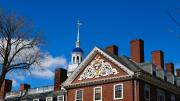As they prepared to assume the faculty deanship of the renovated Lowell House last summer, David Laibson and Nina Zipser announced they would relocate certain portraits—notably that of Abbott Lawrence Lowell, Harvard’s president from 1909 to 1933, whom they pointedly noted “was a person behind his times…responsible for intensifying racism, anti-Semitism, and homophobia” at the University he led.
A year later, amid a national focus on racism, inequality, and the representation of past historical figures (see this dispatch on the removal of a statue of John C. Calhoun), Laibson and Zipser have proposed a different kind of query into their House’s past and current identity. In an email to the community last week, they wrote:
Here in Lowell House, we'll be continuing our own conversation about anti-racism. This academic year, a working group will discuss the history of our own House and its relationship to the entire Lowell family, including Abbott Lawrence Lowell, who once led the University (1909-33) and is remembered for his racism, anti-semitism, purges of gay students, sexism, and xenophobia. We will discuss the circumstances under which the House was originally named (for the Lowell family as a whole) and the arguments for and against changing the name. We have started discussing some new names with the Lowell community (listed here in historical sequence by birth): John Lowell House (after the abolitionist Massachusetts judge and co-author of the article in the Massachusetts Constitution which abolished slavery in this state in 1783), James Russell Lowell House (after the 19th century abolitionist, whose poetry was quoted by W. E. B. Du Bois and Martin Luther King), Amy Lowell House (after the Pulitzer Prize winning poet, who lived with her gay partner at the same time that her brother purged gay members from the Harvard community), W. E. B. Du Bois House (after the ground-breaking sociologist, with a Harvard PhD, who studied racism and co-founded the NAACP), and Cecilia Payne-Gaposchkin House (after the path breaking astronomer whose own path to tenure was initially blocked by Abbott Lawrence Lowell).
Renaming a residential college facility is not unknown. Yale renamed its Calhoun College in 2017. And Princeton has recently announced it would re-name its public-policy school and a residential college, both of which were titled after Woodrow Wilson, reversing its prior decision to retain the names. The university cited Wilson’s “racist thinking and policies” for making him “an inappropriate namesake for a school or college whose scholars, students, and alumni must stand firmly against racism in all its forms.”
At Harvard, the Law School withdrew its shield, adapted in the 1930s, which was based on the crest of the family of Isaac Royall Jr., an eighteenth-century sugar-plantation owner whose fortune endowed a professorship and helped establish the school.
As Laibson and Zipser forthrightly acknowledged in their community message, “Naturally, we don't have the authority to rename Lowell House, but we all have a voice that we can bring to the Corporation where this authority rests. If you are interested in joining this working group, please let us know.” Their personal authority is not nil: Laibson is Goldman professor of economics and former chair of that formidable department, and Zipser is dean for faculty affairs and planning in the Faculty of Arts and Sciences—the senior academic officer for appointments in FAS. As faculty deans of Lowell House, they are recognized leaders within FAS.
At the least, they have begun a wider discussion about whom the College and FAS have chosen to recognize and honor, during a period of national reckoning with America’s past. They do so at a time when Harvard under former President Drew Gilpin Faust made an initial assessment of its past engagement with slavery—and under her successor, Lawrence S. Bacow, has determined to research further the extent of that engagement and “understanding of the impact of slavery” on the University as it was established and evolved.









